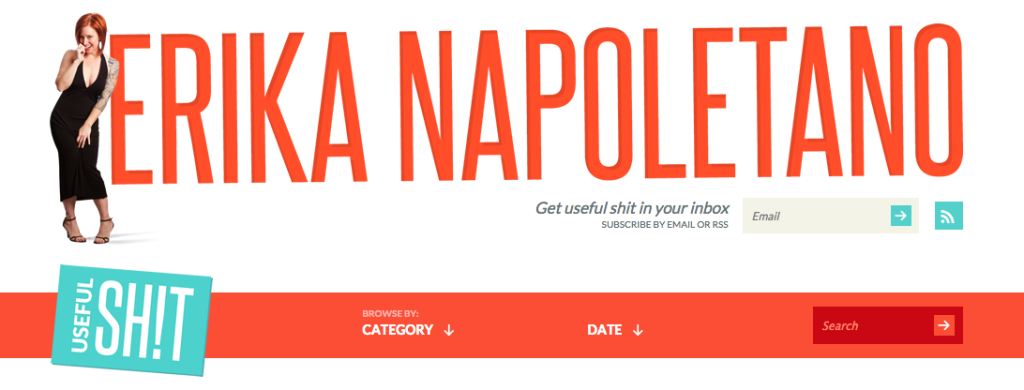- Blog Home
- Content Marketing
- Jd Peterson
- What's The F*Cking Deal With Swearing In Blog Posts?
What's The F*cking Deal With Swearing in Blog Posts?

You've read articles with swear words before, but is it an effective marketing tactic? Scripted investigates.
To curse or not to curse, that is the question at hand. The answer will reveal itself when we measure the engagement of this blog post, because I plan on cussing like a drunken damn sailor in it!
Bullshit aside - see, there I go - our team was having a serious debate on whether or not it was okay to use profanity in a company blog. So we decided to explore the topic and share our thoughts here.
Everyone in content marketing is looking for a way to rise above the noise. I get it - there's a lot of content being shared out there. With this in mind, some have taken a leap of faith and added curse words in their blog posts. The idea might be to spark controversy, appear more human, or maybe just to be different. But is this really the most effective method?
A couple months ago, a blog post titled "The Subtle Art of Not Giving a F*ck" went viral. And we have to admit, it was a well-written article that clearly resonated with a lot of people. So, is it okay to swear in an article?
Cursing in a blog post or article can grab a reader's attention quickly and make a sentence pop off the page, but this "colorful" way of expressing a point doesn't always work for everyone. It's important for content marketers to understand their audience before they go out on a limb and alienate their readership with a simple "shit" or "fuck."
Many of us curse in our own lives. It's great for getting someone's attention, getting a laugh, or expressing an emotion in a more pronounced way. However, we also know that cursing isn't always appropriate, and there are clearly times when whomever we are communicating with simply won't appreciate it. Personally, I have a bit of a foul mouth. But stick me in a church or my parents' house, and my vocabulary is as clean as can be!
The same concept applies to producing content. Writers should be aware of their audience and know whether a bit of swearing could liven up a post or article. Only if it goes with the business' style should writers then consider adding cuss words. For example, startups looking for an edgy angle, lifestyle blogs, gossip writers, and even political and business writers can all add some swear words if they incorporate them in a natural manner. If it feels forced to the writer, it will probably feel forced to the reader as well.
For other organizations, like medical companies, government agencies, or a corporate law firm, profanity will only get in the way of the "dependable and trustworthy" image these types of organizations often try to project. After all, you don't want a hospital that's about to provide surgery to a patient dropping f-bombs in a blog post in which they describe their services.
Swearing is potentially a great way to add some impact to a piece of writing, but unfortunately, there isn't any set formula to determine whether cursing is appropriate. Ultimately, using a bit of common sense is a good strategy when gauging whether cursing will be generally acceptable or a huge disaster.
There are some methods marketers can use to test the waters and reduce any potential negative impact of using profanity in their content.
- Keep swearing out of headlines or excerpts. This helps keep the main page free of profanity. (This may not apply if a writer or company is trying to build a seriously sassy image.)
- Think about adding a tag to posts, such as #NSFW, or even a disclaimer if there's some truly salty language included.
- Experiment with censored curse words. Symbols like %&*! or curse words that are a bit less intense than the f-bomb can create an edgy image without devolving into vulgarity.
- Consider phrases like "Our product kicks serious ass!" or "Are you tired of service that sucks?"
Don't be afraid to gauge user reactions in comments and in e-mails. If there's a seriously negative response, it's okay to back away, but many bloggers will be surprised by how many readers appreciate a more "lively" tone in content.
As we noted before, our curiosity peaked after reading the blog post about not giving a f*ck. However, author Mark Manson isn't the only one engaging in this risky behavior.
 The Readhead Writing Blog, a wildly popular blog about business topics and consulting, also happens to feature articles such as "Why Your Life Is F*cked Up" and a reoccurring column entitled "The Latest B*tch Slap." That doesn't stop Erika Napoletano, the blog's proprietor, from getting invited to do TED Talks and cultivating a huge readership base. Napoletano represents a good example of a writer who has embraced swearing and used it to connect with readers.
The Readhead Writing Blog, a wildly popular blog about business topics and consulting, also happens to feature articles such as "Why Your Life Is F*cked Up" and a reoccurring column entitled "The Latest B*tch Slap." That doesn't stop Erika Napoletano, the blog's proprietor, from getting invited to do TED Talks and cultivating a huge readership base. Napoletano represents a good example of a writer who has embraced swearing and used it to connect with readers.
Another example is Thug Kitchen, which is a hit blog about vegan cooking topics that regularly uses profanity while describing how to make delicious food. In fact, it even invites users to "Sign the F*ck Up" for updates. The blog has become so popular that Gwyneth Paltrow recommended it. Its liberal use of swearing is a major part of Thug Kitchen's appeal, a tactic that has undoubtedly led to increased reader engagement and interest.
While swearing can be negative in many situations, the Harvard Science Review cites the fact that swearing can help create a more informal and intimate atmosphere, which can lead to feelings of belonging to a community. At the same time, swearing can also help alleviate stress during difficult situations or during moments of pain or frustration - or to express a profound experience with greater impact.
Other studies have shown that swearing can increase persuasiveness and help develop a positive attitude towards a speaker's perceived intensity and the topic being addressed. Conducted by psychologists, this research is also relevant for marketers and content producers who want to get their message across in a new way.
In fact, in many ways swearing is becoming more mainstream, with some companies even incorporating swear words into their product names, such as Sassy Bitch wine and Holy Crap cereal (yes, that's an actual cereal). In fact, Holy Crap's massive sales success is partly attributed to its boundary-pushing name. The reason? In a crowded market where many messages can get lost, it pays to add a little shock value once in a while.
Swearing in content marketing is new territory, but with the right attitude and circumstances, it can have a powerful effect. Hell yeah, b*tches!
What are your thoughts on swearing in blog posts? Share them with us in the comments section below. (We promise not to cuss you out if we disagree.)
Get some damn high quality written content ranging from blog posts to white papers with Scripted.
Get Content
To curse or not to curse, that is the question at hand. The answer will reveal itself when we measure the engagement of this blog post, because I plan on cussing like a drunken damn sailor in it!
Bullshit aside - see, there I go - our team was having a serious debate on whether or not it was okay to use profanity in a company blog. So we decided to explore the topic and share our thoughts here.
Everyone in content marketing is looking for a way to rise above the noise. I get it - there's a lot of content being shared out there. With this in mind, some have taken a leap of faith and added curse words in their blog posts. The idea might be to spark controversy, appear more human, or maybe just to be different. But is this really the most effective method?
A couple months ago, a blog post titled "The Subtle Art of Not Giving a F*ck" went viral. And we have to admit, it was a well-written article that clearly resonated with a lot of people. So, is it okay to swear in an article?
Cursing in a blog post or article can grab a reader's attention quickly and make a sentence pop off the page, but this "colorful" way of expressing a point doesn't always work for everyone. It's important for content marketers to understand their audience before they go out on a limb and alienate their readership with a simple "shit" or "fuck."
When Swearing Does and Doesn't Work
Many of us curse in our own lives. It's great for getting someone's attention, getting a laugh, or expressing an emotion in a more pronounced way. However, we also know that cursing isn't always appropriate, and there are clearly times when whomever we are communicating with simply won't appreciate it. Personally, I have a bit of a foul mouth. But stick me in a church or my parents' house, and my vocabulary is as clean as can be!
The same concept applies to producing content. Writers should be aware of their audience and know whether a bit of swearing could liven up a post or article. Only if it goes with the business' style should writers then consider adding cuss words. For example, startups looking for an edgy angle, lifestyle blogs, gossip writers, and even political and business writers can all add some swear words if they incorporate them in a natural manner. If it feels forced to the writer, it will probably feel forced to the reader as well.
For other organizations, like medical companies, government agencies, or a corporate law firm, profanity will only get in the way of the "dependable and trustworthy" image these types of organizations often try to project. After all, you don't want a hospital that's about to provide surgery to a patient dropping f-bombs in a blog post in which they describe their services.
Swearing is potentially a great way to add some impact to a piece of writing, but unfortunately, there isn't any set formula to determine whether cursing is appropriate. Ultimately, using a bit of common sense is a good strategy when gauging whether cursing will be generally acceptable or a huge disaster.
Tactics For Using $&#*
There are some methods marketers can use to test the waters and reduce any potential negative impact of using profanity in their content.
- Keep swearing out of headlines or excerpts. This helps keep the main page free of profanity. (This may not apply if a writer or company is trying to build a seriously sassy image.)
- Think about adding a tag to posts, such as #NSFW, or even a disclaimer if there's some truly salty language included.
- Experiment with censored curse words. Symbols like %&*! or curse words that are a bit less intense than the f-bomb can create an edgy image without devolving into vulgarity.
- Consider phrases like "Our product kicks serious ass!" or "Are you tired of service that sucks?"
Don't be afraid to gauge user reactions in comments and in e-mails. If there's a seriously negative response, it's okay to back away, but many bloggers will be surprised by how many readers appreciate a more "lively" tone in content.
Writers Swear - And Sometimes Swear Big
As we noted before, our curiosity peaked after reading the blog post about not giving a f*ck. However, author Mark Manson isn't the only one engaging in this risky behavior.
 The Readhead Writing Blog, a wildly popular blog about business topics and consulting, also happens to feature articles such as "Why Your Life Is F*cked Up" and a reoccurring column entitled "The Latest B*tch Slap." That doesn't stop Erika Napoletano, the blog's proprietor, from getting invited to do TED Talks and cultivating a huge readership base. Napoletano represents a good example of a writer who has embraced swearing and used it to connect with readers.
The Readhead Writing Blog, a wildly popular blog about business topics and consulting, also happens to feature articles such as "Why Your Life Is F*cked Up" and a reoccurring column entitled "The Latest B*tch Slap." That doesn't stop Erika Napoletano, the blog's proprietor, from getting invited to do TED Talks and cultivating a huge readership base. Napoletano represents a good example of a writer who has embraced swearing and used it to connect with readers.Another example is Thug Kitchen, which is a hit blog about vegan cooking topics that regularly uses profanity while describing how to make delicious food. In fact, it even invites users to "Sign the F*ck Up" for updates. The blog has become so popular that Gwyneth Paltrow recommended it. Its liberal use of swearing is a major part of Thug Kitchen's appeal, a tactic that has undoubtedly led to increased reader engagement and interest.
The Actual Science Behind Swearing
While swearing can be negative in many situations, the Harvard Science Review cites the fact that swearing can help create a more informal and intimate atmosphere, which can lead to feelings of belonging to a community. At the same time, swearing can also help alleviate stress during difficult situations or during moments of pain or frustration - or to express a profound experience with greater impact.

Other studies have shown that swearing can increase persuasiveness and help develop a positive attitude towards a speaker's perceived intensity and the topic being addressed. Conducted by psychologists, this research is also relevant for marketers and content producers who want to get their message across in a new way.
In fact, in many ways swearing is becoming more mainstream, with some companies even incorporating swear words into their product names, such as Sassy Bitch wine and Holy Crap cereal (yes, that's an actual cereal). In fact, Holy Crap's massive sales success is partly attributed to its boundary-pushing name. The reason? In a crowded market where many messages can get lost, it pays to add a little shock value once in a while.
Swearing in content marketing is new territory, but with the right attitude and circumstances, it can have a powerful effect. Hell yeah, b*tches!
What are your thoughts on swearing in blog posts? Share them with us in the comments section below. (We promise not to cuss you out if we disagree.)
Need written content that doesn't suck?
Get some damn high quality written content ranging from blog posts to white papers with Scripted.
Get Content